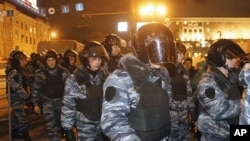Russia’s ruling party won only half of the votes in elections on Sunday. But opponents say even that poor showing was boosted by widespread fraud. Now they are protesting.
Protests against Sunday’s Duma elections are spreading across Russia.
On Tuesday, the interior ministry flooded downtown Moscow with dozens of prison trucks and as many as 50,000 police and troops.
Despite this show of force, protesters turned out and black helmeted riot police wrestled into detention a total of 300 people, largely off the sidewalks of Tverskaya, the capital’s most expensive shopping avenue.
Police arrested 200 more in St. Petersburg and dozens more in other cities. Dozhd, a private internet TV channel reported that protests took place in 50 Russian cities.
In Moscow, police protected pro-government demonstrators who banged drums and chanted “Rossiya, Rossiya.”
Many protesters seemed to be high school students, brought in groups, and clearly unfamiliar with downtown Moscow’s streets and subways.
Denis, a member of an opposition party Yabloko, took refuge in Mayakovskaya subway station.
He said he thought the pro-government protesters were paid.
With the opposition planning a major Moscow protest for Saturday, a judge imposed 15-day sentences on two organizers arrested for disobeying police on Monday. They are: Ilya Yashin, an activist, and Alexey Navalny, a blogger with millions of online readers.
Taking another tack, Russia’s ruling duo sought to cool widespread anger over the vote by announcing small concessions on national TV
Prime Minister Vladimir Putin promised to shake up government - if he is elected President in March.
He promised to change governors and the cabinet. The cabinet has continued virtually unchanged during the four years of the Medvedev government, now widely seen as a caretaker time.
For his part, President Medvedev ordered the government agency that conducted Sunday’s election to investigate reports of vote rigging. Russia’s president also reacted harshly to Western criticism of Sunday’s election.
As for foreigners, he said, Russia’s political system “is none of their business.”
But U.S Secretary of State Hillary Clinton, on a visit to neighboring Lithuania, stepped up her criticism Tuesday, saying Russia’s elections were “neither free nor fair.”
A Russian Foreign Ministry spokeswoman immediately responded.
She called Ms. Clinton’s comments “unacceptable.”
On Monday, after Ms. Clinton called for investigation into fraud charges, Konstantin Kosachev, a senior ruling party member, denounced the call as “one of the darkest pages in Russian-US relations.”
On Tuesday, US Senator John McCain, a Republican, was less diplomatic.
After hearing of Monday’s nights arrests near the Kremlin, Senator McCain tweeted this message to Prime Minister Putin: “Dear Vlad, the Arab Spring is coming to a neighborhood near you.”
In Moscow, Boris Gryzlov, speaker of the Duma, reacted with outrage. He compared the American senator to the Mad Hatter in the book Alice in Wonderland.
Russia’s political unrest may now be taking an economic toll.
On Tuesday, a finance ministry official raised the official estimate of capital flight from Russia. Now, he said it will surpass $85 billion this year.
Protests over Russian Elections Spread to More Cities
- By James Brooke




